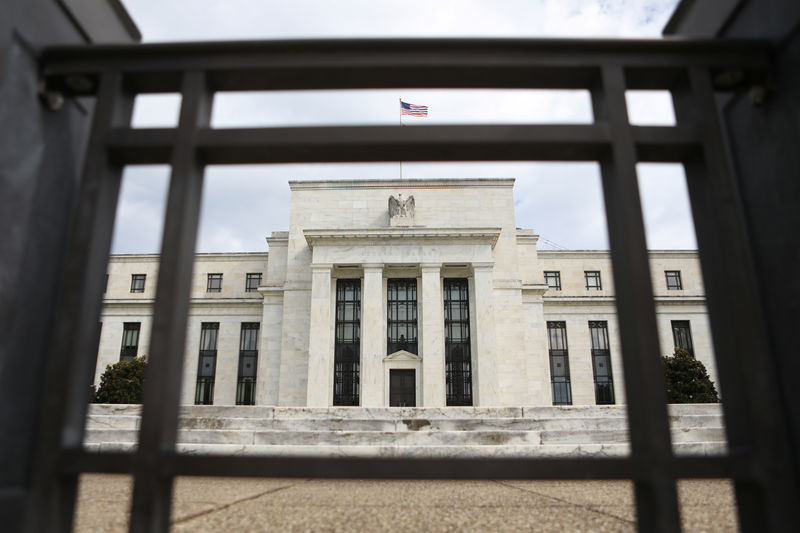By Noreen Burke
Investing.com - The Federal Reserve, European Central Bank and the Bank of Japan are all set to hold policy meetings this week after the coronavirus induced global economic crisis prompted them to implement aggressive monetary easing measures. Investors will be on the alert for indications that policymakers may have to do yet more to shield economies from the ongoing economic fallout. First quarter GDP data from the U.S. and the Euro Zone will be the economic data to watch, closely followed by U.S. jobless claims data. Oil prices will also be in focus after U.S. crude plunged into negative territory last week for the first time ever. Here is what you need to know to start your week.
- Fed meeting
The Fed will hold its first scheduled monetary policy meeting since January on Tuesday and Wednesday. But policymakers have met at several unscheduled meetings since then, slashing rates to almost zero, restarting bond purchases and rolling out an unprecedented range of programs to ease credit conditions. The measures have seen the Fed’s balance sheet expand to a record $6.42 trillion.
While the meeting is expected to be less dramatic than the emergency one in March, investors expect to get more details on the Fed's special lending programs, its asset-purchase program and the forward guidance on the target range for the federal funds rate, analysts said.
Investors will also be looking for indications from the Fed about how severe it thinks the recession may be and what is its outlook for economic recovery.
- ECB meeting
The ECB is set to spend just over a trillion euros on asset purchases this year alone, has eased its rules on what it can buy and when, and has ramped up supportive measures for banks.
But pressure on the ECB to step up its monetary easing program is only likely to increase as European Union leaders struggle to agree on fiscal measures to help the continent recover from the pandemic. ECB President Christine Lagarde warned EU leaders last week that the euro-area economy could shrink as much as 15% this year.
Analysts estimate that at the current daily pace, the ECB's 750 billion euros of emergency bond purchases will be exhausted by October. Some say the ECB will be left with no option but to top up its scheme by a further 500 billion euros soon -- perhaps as early as Thursday.
Meanwhile the BOJ is set to kick off its meeting on Monday with analysts expecting that policymakers could scrap their bond-buying target as they take more aggressive action to combat the widening fallout of the health crisis.
- U.S. GDP, jobless claims data
First quarter GDP data will be the headline figure to watch on the U.S. economic calendar this week. Economic activity ground to a halt in March, after a strong January and February, with the economy shedding around 27 million jobs in five weeks.
“We look for the economy to have contracted 6% annualized in Q1 with much worse to come in 2Q. We look for a 40% annualized fall in output between March and June even if other U.S. states follow the lead of Georgia, Tennessee, Florida and South Carolina and start re-opening their economies in the next two to four weeks”, analysts at ING said.
The other closely watched report will of course be initial jobless claims.
“We are hoping that after three consecutive declines in jobless claims we will see a much sharper fall this week given some states are starting to re-open” ING analysts said.
- Bumper week for Euro Zone data
This week brings data on first quarter GDP, unemployment and inflation for the euro area. The biggest question is how large the contraction in GDP will be after lockdowns were put in place across the bloc since at least the last two weeks of March.
Unemployment figures for March will show how much layoffs contributed to an increase in the jobless rate, while inflation data for April will be difficult to parse with most retailers except for grocery stores closed.
- Oil price turmoil set to continue?
Price action this week will be a test of whether the oil market can regain equilibrium after crude, which had never dropped below $10 a barrel in its nearly 40-year history, plunged to minus $38 a barrel last Monday.
Energy traders have been spooked by the fact that oil storage facilities are nearly full amid a growing glut in a market already hit by collapsing demand due to the coronavirus pandemic.
The volume of futures contracts still open for delivery in June has fallen by the equivalent of 217 million barrels, more than a third, since last Monday, Reuters reported.
Cheaper oil could help promote the recovery when coronavirus lockdowns finally end. Cheap oil lowers energy, transport and manufacturing costs, puts money in consumers' pockets and saves oil-importing countries cash, too, which can then be spent on more useful things.
--Reuters contributed to this report
